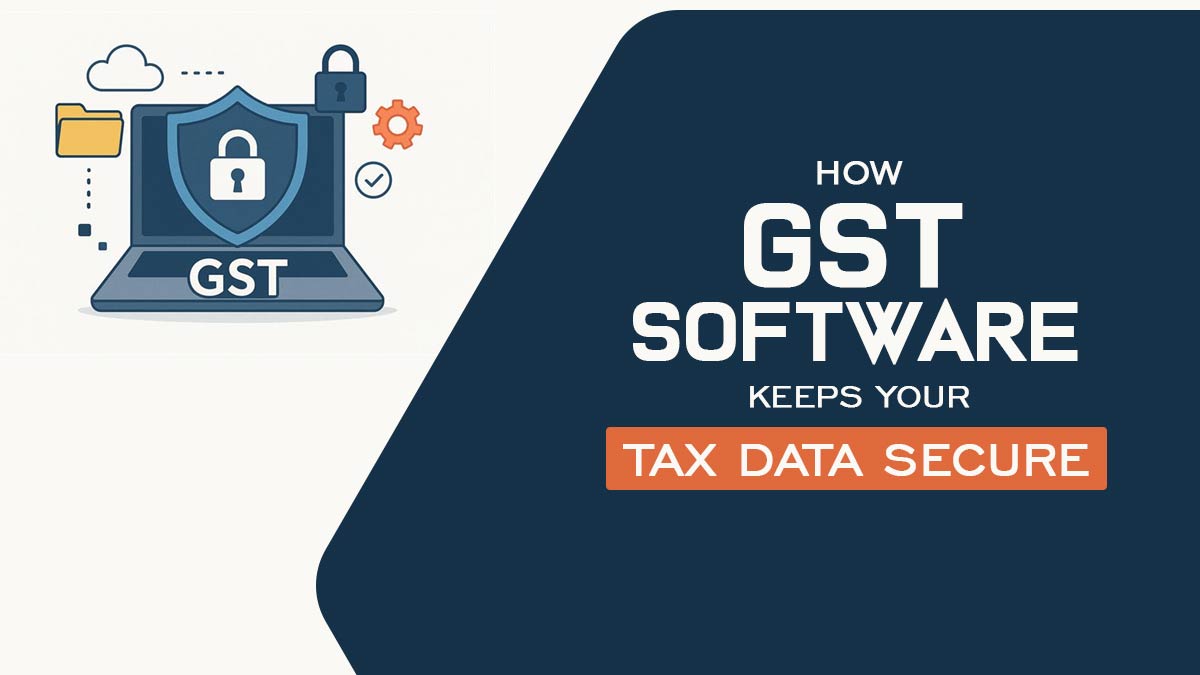
In the present digital-first business world, beyond traditional paper filings and manual entries, tax compliance has evolved immensely. The Goods and Services Tax (GST) rollout in India has transformed the indirect tax landscape by easing the procedure through digital platforms.
Digital transformation carries responsibilities for the protection of sensitive business and financial data. Assuring data security in GST software is not only a technical problem, but it is also important for keeping trust, complying with regulations, and ensuring business continuity.
Comprehending the GST Data sensitivity
GST software solutions handle a large volume of sensitive data, including business turnover, supplier and customer information, invoices, bank records, and tax liabilities.
This information is crucial for the financial operations of Chartered Accountants (CAs), tax professionals, and business owners. A single breach or unauthorised access can expose the company’s internal finances, and its clients and vendors.
Due to the interconnected nature of GST compliance, where businesses submit data to the Goods and Services Tax Network (GSTN), it is vital to prioritise data security at every stage. Any compromise to data integrity could lead to misreporting, penalties, financial losses, and damage to a company’s reputation.
The Evolving Threat of Cyberattacks
Across the world, cybercrimes are rising, and their main targets are financial software platforms. The systems that do not have enough protection can be attacked by phishing attacks, ransomware, and malware. Tax and accounting platforms are the main focus of hackers as they store highly valuable, sensitive financial data. Attackers can access confidential invoices, PAN details, and even digital signatures from a violation in a GST filing system.
As small and medium-sized businesses (SMBs) often lack dedicated cybersecurity teams or strong IT infrastructure, they are more vulnerable. For these businesses, choosing GST software that emphasises data protection is crucial.
Significance of Data Security in GST Software
Protection of Secret Information: GST data secures important business insights and personal identifiers. A secure GST platform confirms that all this data remains encrypted, reducing the risk of exposure or misuse.
Compliance with Legal Standards: Businesses must legally secure financial data under the Information Technology Act and GST regulations. Software that losses to comply with these security standards can lead to legal complications and non-compliance penalties.
Maintaining Business Reputation: A single data breach can deteriorate years of customer trust. Effective data security exhibits professionalism and accountability, key features that clients desire from financial consultants and businesses.
Operational Continuity: A consistent workflow is ensured under the robust cybersecurity measures. A system that lacks security can lead to downtime, delayed filings, and financial setbacks.
Preventing Internal Misuse: The breach of data is not always external. Unauthorised access via internal users or employees can consequences in fraud or data leaks. To track user activity and prevent internal misuse, a secure GST software utilises the access control procedure.
Security Features to Look for in GST Software
Businesses for ensuring complete data protection need to evaluate the security framework of any GST software before choosing it. The following features are crucial:
End-to-End Encryption: Safeguards sensitive data during transmission and storage, making it unreadable to unauthorised parties.
Two-Factor Authentication (2FA): Adds security by verifying user identity through multiple credentials.
Role-Based Access Control: Restricts access established on user roles, ensuring only authorised personnel can view or modify specific data.
Regular Backups: Automated backups support recovering data for accidental loss, corruption, or cyberattack.
Audit Trails: Maintain logs of user activities, ensuring accountability and facilitating effortless tracking of any dubious behaviour.
Cloud Security: Adherence to ISO-certified security standards and regular vulnerability testing is crucial for cloud-based GST software.
Role of the User in Data Protection
User awareness is essential for keeping data security, even with the most advanced GST software. Businesses should train their staff on best practices, like creating strong passwords, avoiding suspicious links, and ensuring that system updates are installed regularly. Additionally, conducting regular data audits and executing strong cybersecurity policies can improve protection.
Choosing the Right GST Software
GST software, which balances operations with security, must be the main preference. Reputable solutions have the feature of advanced encryption, secure cloud storage, and multi-layer authentication systems to safeguard sensitive data. Such platforms ease accurate tax filing and ensure that business data stays secure at every phase.
Closure: Data security has emerged from a technical consideration to a strategic necessity. Since GST compliance continues to change, securing financial data should be the main focus of every business’s digital strategy. The accurate GST software acts as a shield against cyber threats, allowing businesses to keep trust, comply with regulations, and function seamlessly in the digital economy.
Securing your GST data is not only a concern of avoiding risks, but it also ensures the long-term sustainability and credibility of your business.









